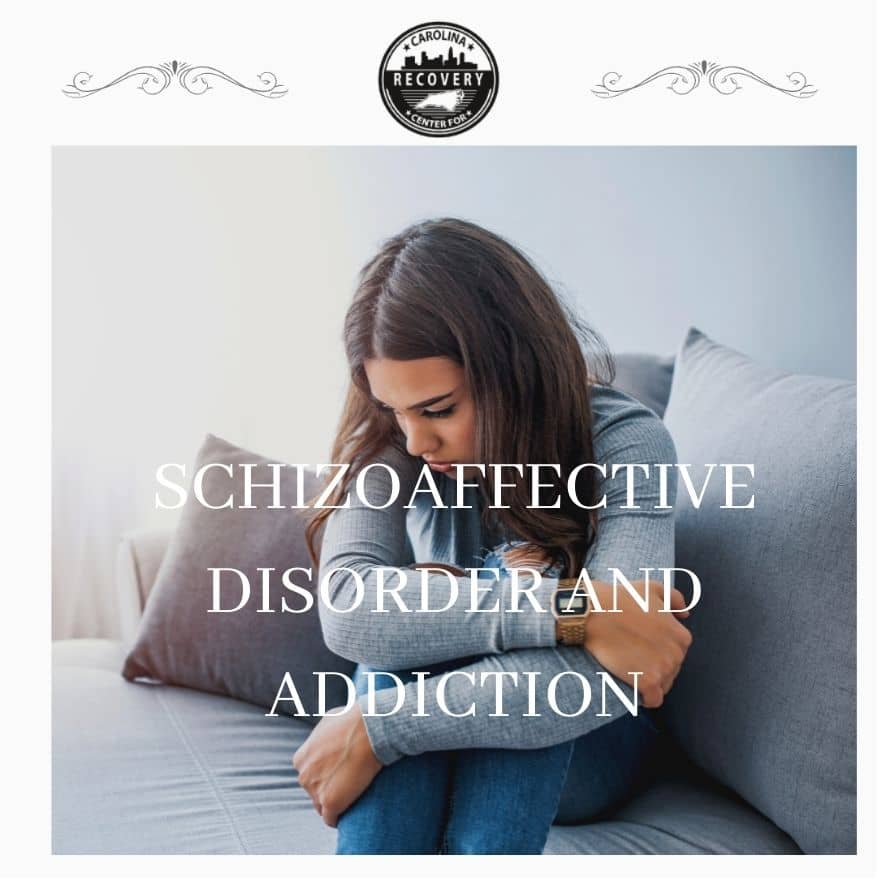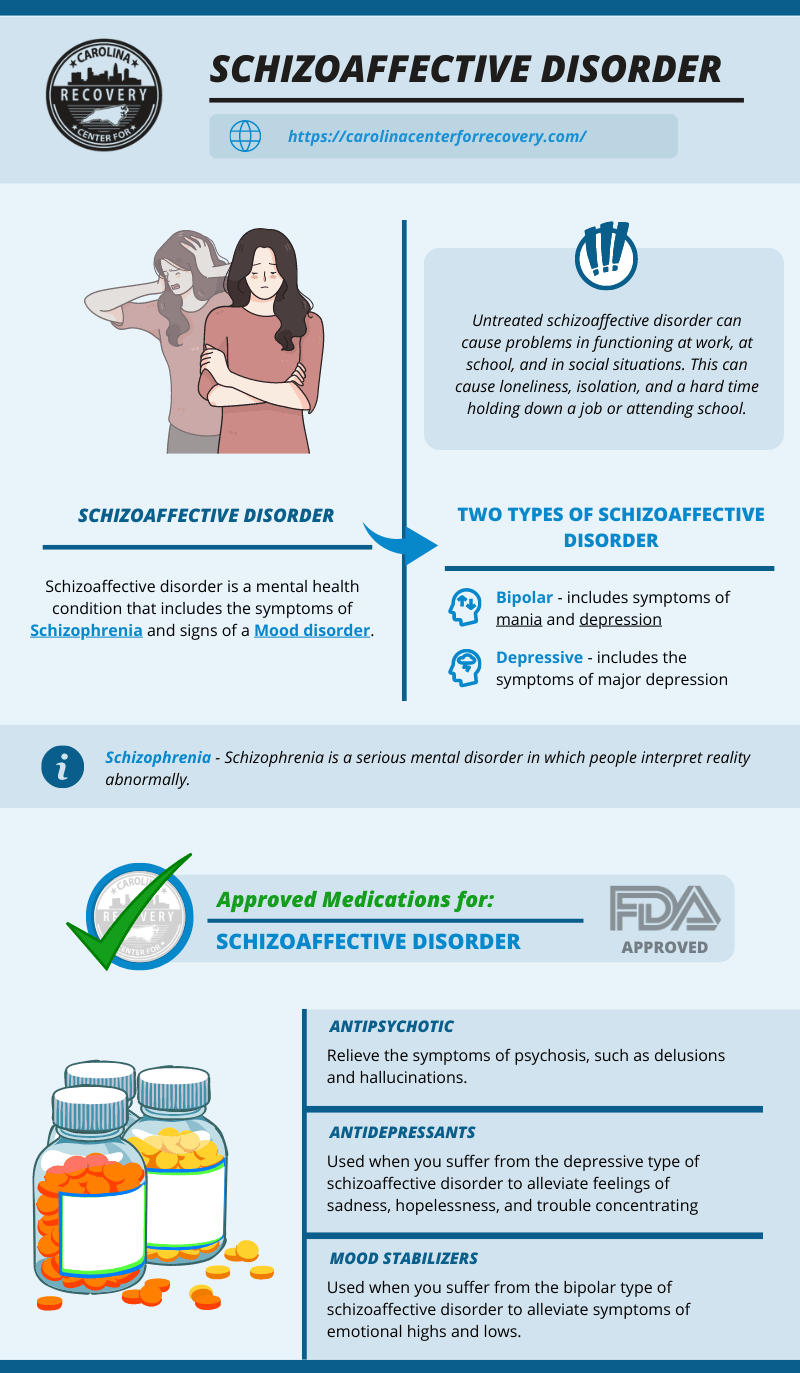Schizoaffective Disorder and Substance Abuse: Signs, Symptoms, and Treatment

Medically Verified: 2/1/24
Medical Reviewer
Chief Editor

All of the information on this page has been reviewed and verified by a certified addiction professional.
Schizoaffective disorder is a mental health condition that includes the symptoms of schizophrenia and signs of a mood disorder. For example, people with this condition may experience hallucinations, delusions, mania, and depression. Because this condition includes symptoms of multiple disorders, many people are misdiagnosed with either schizophrenia or bipolar at first.
There are two types of schizoaffective disorder, with both including the symptoms of schizophrenia. These types include:
- Bipolar Type – which includes symptoms of mania and depression
- Depressive Type – which only includes the symptoms of major depression
Untreated schizoaffective disorder can cause problems in functioning at work, at school, and in social situations. This can cause loneliness, isolation, and a hard time holding down a job or attending school. As a result, schizoaffective disorder can cause you to seek forms of self-medication, leading to the development of co-occurring substance use disorder or addiction.

The Symptoms of Schizoaffective Disorder
The symptoms of schizoaffective disorder vary from person to person. While you may experience a combination of hallucinations, delusions, and depression, another person may deal with the symptoms of mania.
Even though the development and course of schizoaffective disorder is different for everyone, the defining features of this condition include a major mood episode (mania or depression) and at least a two-week period of psychotic symptoms when mood symptoms are not present.
The signs and symptoms of schizoaffective disorder depend on whether you suffer from bipolar or depressive type. However, the general symptoms include:
- Experiencing delusions (having false, fixed beliefs, despite evidence to the contrary)
- Hallucinations (auditory, visual, and tactile)
- Impaired communication and speech
- Bizarre or unusual behavior
- Symptoms of depression, such as feeling numb, sad, hopeless, or worthless
- Periods of mania, which include an increase in energy, a decreased need for sleep, impulsivity, and behaviors that are out of character
- Impaired functioning in work, school, and your social life
- Having a hard time keeping up with personal hygiene and grooming
It is important to note that schizoaffective disorder can cause thoughts of self-harm or suicide. During a study on people with schizophrenia and schizoaffective disorder, The National Library of Medicine found that 34% reported a history of suicide attempts.[1] If you or a loved one suffer from this condition and display signs of suicidal ideation, you must seek professional help.
How is Schizoaffective Disorder Related to Addiction?
According to the National Alliance on Mental Illness, “Schizoaffective disorder is relatively rare, with a lifetime prevalence of only 0.3%.”[2] With that being said, there is less research focused on schizoaffective disorder as a whole. However, there are studies that show that having a psychotic condition like schizoaffective disorder can increase your risk of developing a substance use disorder or addiction.
The National Library of Medicine found that 37.9% of patients with psychotic disorders had a lifetime prevalence of substance use disorder.[3] But why does having a psychotic disorder make you more at risk of developing an addiction?
Early on, you may begin attempting to self-medicate your symptoms of schizoaffective disorder with drugs or alcohol. However, using substances only worsens the symptoms of your disorder. Self-medication can quickly turn into a chemical dependency, causing the co-occurrence of schizoaffective disorder and addiction.
Treating Addiction and Schizoaffective Disorder as Co-Occurring Conditions
When you have both schizoaffective disorder and addiction, both conditions must be treated simultaneously. If you left one condition untreated, it would exacerbate the symptoms of the treated one, leading to a relapse. Thankfully, dual diagnosis treatment programs combine traditional addiction treatment tactics with evidence-based schizoaffective disorder treatment methodologies.
Detox
The first step in treating schizoaffective disorder and addiction is detox. This process helps eliminate all of the substances from your body. Depending on the type of substance you were abusing, you may be given tapering medications to prevent the symptoms of withdrawal from happening, allowing you to focus on the emotional and psychological aspects of your recovery.
Medications
Medications are often used in the treatment of schizoaffective disorder to soothe symptoms of psychosis, mania, or depression. The only medication approved by the FDA to treat schizoaffective disorder is paliperidone (Invega), an antipsychotic.
However, some medications approved to treat other mental health conditions may be effective in relieving the symptoms of schizoaffective disorder. These include:
- Antipsychotics – relieve the symptoms of psychosis, such as delusions and hallucinations
- Antidepressants – used when you suffer from the depressive type of schizoaffective disorder to alleviate feelings of sadness, hopelessness, and trouble concentrating
- Mood Stabilizers – used when you suffer from the bipolar type of schizoaffective disorder to alleviate symptoms of emotional highs and lows
Psychotherapy
Psychotherapy is used to treat both schizoaffective disorder and substance use disorders. Therapeutic processes such as family therapy, psychosocial strategies, self-care peer support, psychotherapy, and integrated care are all used to improve the symptoms of both conditions.
Additionally, cognitive behavioral therapy (CBT) can help you learn how to cope with the symptoms of schizoaffective disorder and addiction by helping you change negative patterns of thinking and teaching you how to use positive coping mechanisms to overcome hardships.
Finding Help for Schizoaffective Disorder and Addiction
If you or a loved one suffer from co-occurring schizoaffective disorder and substance abuse, help is available. Dealing with these two conditions can significantly impact your ability to live your daily life. Instead of struggling on your own, consider attending a dual diagnosis treatment center that can help you recover from the effects of both mental health conditions.
Contact Carolina Recovery Center today for more information on our dual diagnosis recovery program.
References:

